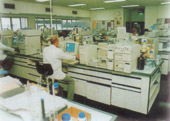Pharmacy has been shown to be one of the most diverse professions in the health care industry. Pharmacists can choose employment in any one of the four main sectors including community pharmacy, hospital pharmacy, industrial pharmacy and academia.
Community Pharmacy
 Pharmacists in the community setting are responsible for supervising the dispensing of medication, advising patients on treatment options for minor ailments, counselling patients with regard to their medication and their health, performing basic clinical tests such as blood glucose monitoring and blood pressure testing, providing health information to the community as well as many other functions. Community pharmacists may opt to buy their own business, go into partnership with another pharmacist or simply work as a salaried pharmacist. Working in this sector requires that pharmacists have good interpersonal and communications skills as well as being able to work accurately in stressful conditions. Many pharmacists who have these skills find the challenging nature of retail pharmacy extremely rewarding.
Pharmacists in the community setting are responsible for supervising the dispensing of medication, advising patients on treatment options for minor ailments, counselling patients with regard to their medication and their health, performing basic clinical tests such as blood glucose monitoring and blood pressure testing, providing health information to the community as well as many other functions. Community pharmacists may opt to buy their own business, go into partnership with another pharmacist or simply work as a salaried pharmacist. Working in this sector requires that pharmacists have good interpersonal and communications skills as well as being able to work accurately in stressful conditions. Many pharmacists who have these skills find the challenging nature of retail pharmacy extremely rewarding.
Hospital Pharmacy
 Hospital pharmacists are required in both the public and private sectors where they are an integral member of the health care team. Pharmacists in hospitals dispense medication to both in- and out-patients, provide clinical information to other health care professionals, are actively involved in stock control and management, assess patient therapy as well as many other duties. Processes such as small-scale product manufacture and medicine re-packaging into patient-ready-packs are supervised by hospital pharmacists. Hospital pharmacists play an important role in managing patient care positivley influencing therapeutic outcomes by interacting closely with other proffessional in the health care team.
Hospital pharmacists are required in both the public and private sectors where they are an integral member of the health care team. Pharmacists in hospitals dispense medication to both in- and out-patients, provide clinical information to other health care professionals, are actively involved in stock control and management, assess patient therapy as well as many other duties. Processes such as small-scale product manufacture and medicine re-packaging into patient-ready-packs are supervised by hospital pharmacists. Hospital pharmacists play an important role in managing patient care positivley influencing therapeutic outcomes by interacting closely with other proffessional in the health care team.
Industrial Pharmacy
 A pharmacist working in an industrial environment may be involved in a number of areas, including pharmaceutical product research, marketing, production, quality control and registration. An industrial pharmacists ensure the manufacture of quality products according to good manufacturing practices. The generic skills required for a pharmacist in industry vary greatly depending on the area in which they find themselves.
A pharmacist working in an industrial environment may be involved in a number of areas, including pharmaceutical product research, marketing, production, quality control and registration. An industrial pharmacists ensure the manufacture of quality products according to good manufacturing practices. The generic skills required for a pharmacist in industry vary greatly depending on the area in which they find themselves.
Academic Pharmacy
 Reasearch and teaching are the primary functions of a pharmacist in an academic institution. At NMMU we pride ourselves in producing graduates of an extremely high quality through innovative teaching methods. This can not be done without the academic pharmacists who do the training. A career in academic pharmacy required that the pharmacist undertake a higher degree, either a masters or doctorate, and participate activley in research. Although not always the most financially beneficial of the four sectors, an academic career is always a rewarding one.
Reasearch and teaching are the primary functions of a pharmacist in an academic institution. At NMMU we pride ourselves in producing graduates of an extremely high quality through innovative teaching methods. This can not be done without the academic pharmacists who do the training. A career in academic pharmacy required that the pharmacist undertake a higher degree, either a masters or doctorate, and participate activley in research. Although not always the most financially beneficial of the four sectors, an academic career is always a rewarding one.